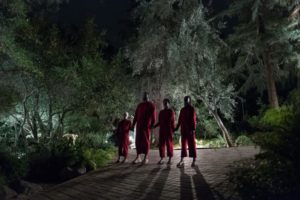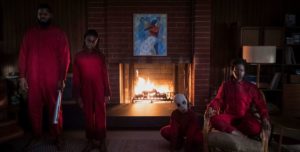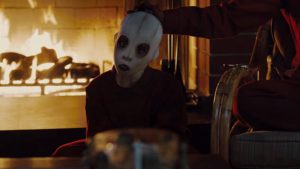Movie Review: Us

In the opening moments of Jordan Peele’s new film Us, the writer-director references the 1986 benefit event Hands Across America in a segment taken from a television promotion. It’s the early part of the summer of 1986 and the allusion to this publicity campaign which sought to help those living in poverty throughout the USA serves a double purpose. Firstly, there is the contextual one which is followed up as a young girl by the name of Adelaide Wilson vacations with her parents in the sunny climes of Santa Cruz. Visiting a nearby amusement park by night, Adelaide (sporting a recently-obtained t-shirt of Michael Jackson’s Thriller) wanders off as her father becomes engrossed in a game of Whack-a-Mole. The thin line which exists between well-being and peril even in such an environment as this is suggested here by Peele and also in a beach scene which takes place a short time later. There are inherent dangers in what seem to be the most innocuous of circumstances. Entering a darkened funhouse, Adelaide sees something in the hall of mirrors which elicits a horrified look from her. Years later (a swift jump forward in time informs us that we are in the present day) Adelaide (Lupita Nyong’o) finds herself returning to the Californian coastal city for – presumably – the first time since the traumatic event. She now has a husband in tow – the amiable and near-comical Gabe (Winston Duke) – and two children Zora and Jason. The family are presented to us the audience as upper middle class. They have richer friends in the form of Kitty and Josh Tyler (Elisabeth Moss and Tim Heidecker) who exchange barbs on the beach with a complete lack of shame.

Peele’s second outing as a director does not follow any conventional pattern and is replete with sidebars of humour and eccentricity. Probably best described as a psychological horror, Us nonetheless will leave many a viewer perplexed as to its purpose and intended genre. The early scenes of the present day segment play out like an upmarket dramedy. The family members all have their quirks and mini obsessions – Dad Gabe throws out the bad puns with relish; teenage daughter Zora is predictably addicted to her phone; younger son Jason oddly sports a Halloween mask. Peele appears to have landed us with the everyday middle American family with the exception of Adelaide herself. The thirty-something mother is edgy and the return to Santa Cruz has accentuated this feeling of unease. Before matters in her world go completely askew, she talks about a ‘black cloud’ hanging over the family – perhaps, by extension, the entire country as we shall see. Reveals to this point of the film have informed us that Adelaide saw her doppelganger that night in the mysterious funhouse. Another flashback suggests that she was uncommunicative for a time following the incident. A conversation on the beach with Moss’s character also discloses how her interest and aptitude for dancing came to a seemingly abrupt end.

The societal message which Peele is endeavouring to impart to us becomes clearer when a family of four doppelgangers appear on the drive to the family’s house later that same evening. One forced home invasion later and Adelaide’s family are at the mercy of the nimble look-a-likes. When asked who they are, Adelaide’s double Red (the only one among them who can speak) simply replies that ‘We’re Americans.’ She then proceeds to relay a story – her own narrative – which is the very antithesis of Adelaide’s relatively happy existence – ‘Once upon a time, there was a girl and the girl had a shadow.’ Further exposition – which comes later in the film – reveals how a vast network of doppelgangers have lived below the surface for several generations. Red vaguely references an attempt by the powers-that-be to control the public as the reason for this. The doppelgangers mimic the actions of their doubles in the surface world, but are bereft of the powers of communication with the exception of Red who is their apparent leader. Peele’s 2017 directorial debut Get Out had a social commentary as one of its several thematic undercurrents and the plight of the tethered (as the doppelgangers are called here) can be read as that of the oppressed and downtrodden in American society. The earlier Hands Across America allusion is a clever one on Peele’s part and his character Red has a similar plan in mind with respect to the doppelganger’s overarching scheme to occupy space and capture material possessions above ground. In one telling scene a double admires herself lovingly in the mirror as she applies lipstick. The message on Peele’s part is clear in this moment as it is throughout the film. The impoverished have risen up, but what will they do with their newly-attained status? Will ultimate good follow in the wake of such an uprising? Will the perennially deprived ones right the wrongs of the past? The narrative trajectory of Us suggests that this and other such wishful eventualities seem entirely unlikely given the level of bloodshed which takes place during the course of the rather macabre revolution.

As with the excellent Get Out, Peele has chosen his cast members well and displayed a keen eye for cultural and cinematic references. Lupita Nyong’o unsurprisingly is a standout as Adelaide/Red and she is more than ably supported by the aforementioned Duke and Moss. Shahadi Wright Joseph and Evan Alex are both excellent as the robust kids and newcomer Madison Curry also leaves an impression as the young Adelaide. Peele – who won the Academy Award for Best Original Screenplay for Get Out – is on scripting duties here once again and Us never fails to hold the attention. The sly humour and gripping tension are handled with great aplomb by Peele and admirers of his previous Get Out will be pleased to know that his second feature is not just another example of diminishing returns. Although a psychological horror in the main, Us cannot be simply classified as thus in the same way that Get Out also defied such genre pigeonholing. And as for the much-talked-about ending, viewers will have to make up their own individual minds as to the plausibility of this. In any event, a film of this type which engenders discussion long after the final frame is a very good thing in this day and age. Us is such a film and it scores high with respect to its cast, direction, storyline and abiding sense of ambience and context. Peele’s second feature is well worth the admission price and I, for one, can’t wait to see what he delivers next.
Rating: B+
A scattershot affair which never hit its supposed targets and boasts some truly atrocious acting. I hated the ending which was robbed from the finale of Mad Men!